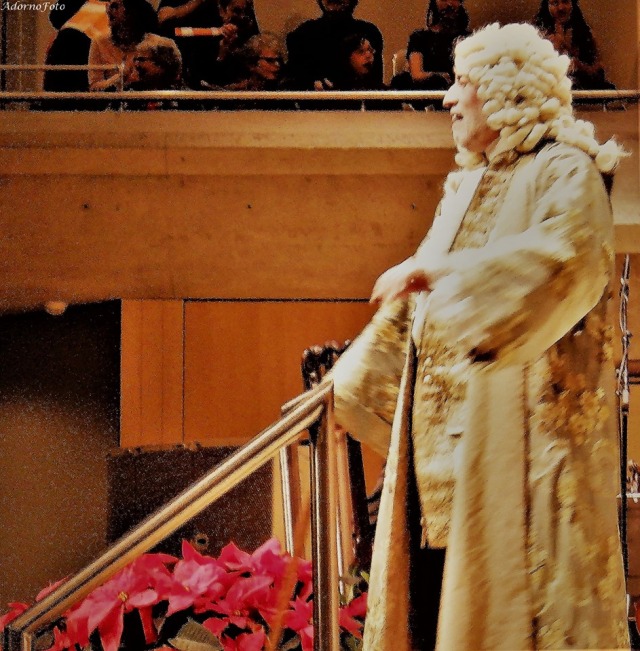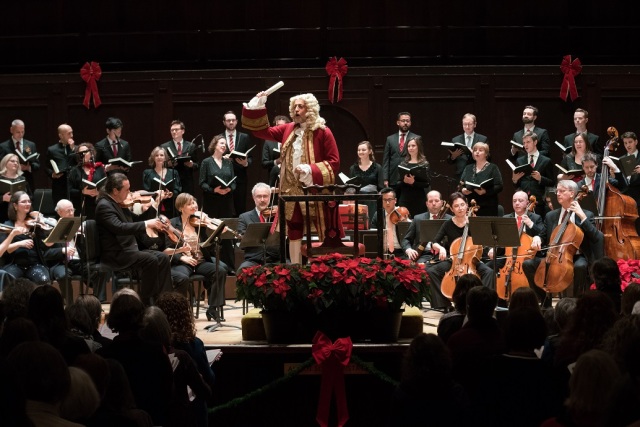I’m trying to find the right word, so please bear with me.
For someone who goes to see concerts & theatre more often than most people, you might never guess that I’m sometimes frustrated. My mantra is “I’m a lucky guy”, because I believe gratitude can be a sacrament, a way to celebrate life.
And yet there are conventions that drive me nuts, barriers to being real. At classical concerts we’re not supposed to clap between movements, and people look down their noses at those who do: even if those spontaneous outbursts may be moments of great beauty. A baby may begin to cry during a concert when everyone else is stifling their every sound, the child for a moment dissenting from the profoundly unnatural artificiality of the crowd.
But of course at a rock concert people are more real. They’ll laugh they’ll cheer or chant, sometimes in the space of a few seconds and all in the same song.
I’m just calibrating what it’s like to go to the annual Singalong Messiah from Tafelmusik. Yesterday afternoon was the 2019 Singalong which in so many ways goes against the usual consensus for proper deportment at a classical concert while emulating something much closer to what we get at a rock concert or a comedy club. The fact that the fellow portraying Handel in costume sometimes seems like more of a stand-up comic than a serious musician helps break down some of the conventions.

Herr Handel waxing eloquent in the middle of one of his lectures (photo: Constance Adorno Barcza)
So I have to let you in on a little secret. For those of us who go to the singalong, it’s simply magic, one of the highlights of the year. The fellow sitting beside me said that it’s how he begins Christmas every year
At one point Herr Handel asks us to stand up if it’s our first singalong. And usually there’s a fair crowd in this group. Then he asks for those going to number 2-5 singalongs (I’m in this group). And then the ones who have done up to 10. Then 11-20 singalongs (the fellow beside me was in this group). Eventually we get to those who have done all 34 (next year it will be 35) Singalongs.
As with Holy Communion, there are some for whom it’s still a new ritual, while for others it begins to resemble something you do your whole life long. The headline might make some sense as I grapple with the implications of a gathering that simultaneously brings everyone together, at times in a frenzy of excitement –as when we’re singing “Hallelujah”—or simply in the joy of watching, listening, and participating together. For a couple of hours we are all of one tribe, the Toronto Handel’s Messiah tribe if you will. While I may be in the audience while the performers are up on the stage at Roy Thomson Hall, we are one, we are united. Oh sure, they (both the Tafelmusik Chamber Choir plus soloists) are singing it more correctly than I am, but I don’t feel the usual gulf I have at a classical concert. There’s none of that implicit shushing of whispers and surreptitious chat. We can talk and laugh throughout.
And why not when the master of ceremonies is so full of wit & charm?
It’s so profoundly different from the Toronto Symphony’s Messiah. I watched from almost the identical seat in section C2 Friday (only 5 rows difference). Something’s much clearer with hindsight. While the four soloists for the TSO have breath-taking credentials for drama and theatricality in the world of opera (where each of them has made their mark): oratorio is a totally different medium. Opera acting is not oratorio acting, especially when the conductor is so busy with the Mozart version –that often has lovely additional textures & voices—that he forgets his job. Pardon me Alexander, but you had one job. The singers are delivering texts from the Bible. Stay out of the way. Yes the music is pretty. But when a soloist is singing you can ask the orchestra to play more quietly.
Ivars Taurins / George Frideric Handel gets this, and I daresay David Fallis (of the Toronto Mendelssohn Choir but also, Opera Atelier) gets this too (even if he had to hand things over to the TSO conductor). The sound of Tafelmusik Baroque orchestra’s instruments doesn’t get quite as loud: particularly if their leader insists that they don’t cover the singers.
The four soloists are giving us oratorio drama rather than operatic drama, and so they stand still, they don’t necessarily sing loudly, but they command our attention with their impeccable diction. While I adore all four of the TSO soloists, they weren’t nearly as intelligible as what we heard in the singalong Saturday afternoon from soprano Margot Rood, mezzo-soprano Lucile Richardot, tenor Thomas Hobbs and baritone Peter Harvey. But then again I wonder how much of that comes back to Herr Handel, holding back the orchestral tide as though he were Moses parting the Red Sea to permit his soloists to cross unscathed..?
It’s too much fun to be mistaken for Holy Communion, yet it’s very respectful of the text all the same. We are not frozen in silent fearful respectful awe. This is a celebration and as uplifting as anything you find in the text of Messiah. We’re juggling our scores (and several times one hears one dropped) and turning pages, actively involved rather than passive. Sometimes we have to jump to our feet (and the leader screams at us to get up… and it’s funny),
Does Ivars Taurins have the coolest job in town? Maybe.
I think the underlying impulse of the singalong is a desire to join in, to break down the artificial division that’s considered normal in the concert hall or the theatre, even if it’s anything but natural. The vicarious wish we all have is held back by the usual concert dynamic that frames music as a performance of those who can for those who can’t. The magic of the singalong is to erase that great divide.
We can and we do.

Tafelmusik Baroque Orchestra, Tafelmusik Chamber Choir, and Ivars Taurins aka Herr Handel (photo: Jeff Higgins)
Pingback: Framing the Pollyanna proposition | barczablog